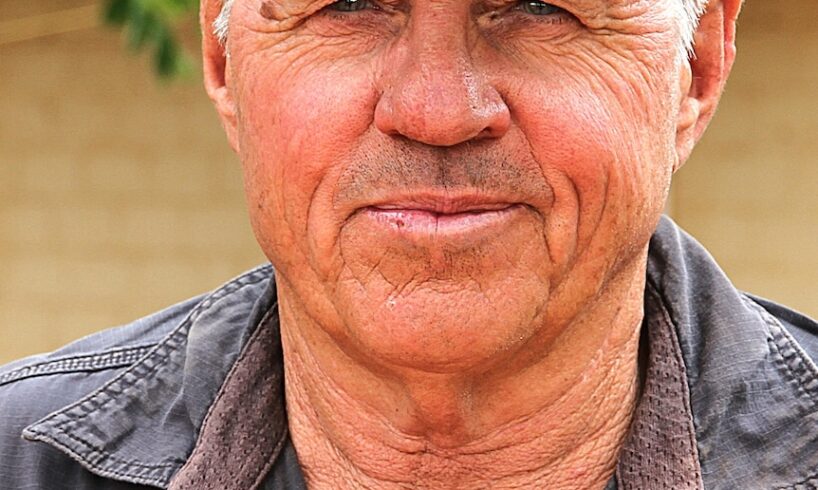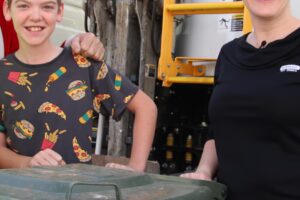
A Pilbara pastoralist says the West Australian government needs to intervene amid growing fears for the region’s water supplies.
Mike Thompson owns the sprawling Mundabullangana (Munda) Station, 100 kilometres south west of Port Hedland and about 1,500 kilometres north of Perth.
The cattle station is situated above the Yule River bore field, which Western Australia’s state-owned Water Corporation owns.
Mundabullangana (Munda) Station sits above the Yule borefield. (ABC Rural: Michelle Stanley)
It supplies about half of Port Hedland’s drinking water, sustaining the planet’s largest export port by tonnage.
Mr Thompson told ABC Radio Perth his station was once renowned for the quality of its water.
But he said he now had to drill deep into the earth to secure water for his cattle.
“We’ve gone from a 40-foot average to a 60-foot average now to get to water,” he said.
“That’s been worrying me for years,” he said.
“We just continually have to keep up with whatever’s going on down below.”
Water Corporation says more water is required to meet the region’s needs. (Supplied: Water Corporation)
He implored the state government to re-examine water allocations amid back-to-back years of scant rainfall.
Cattle country running dry
Mr Thompson’s call is the latest in a string of growing concerns around usage and allocation impacting the wider region’s water resources.
Resource companies extract billions of litres of water, with state permission, each year for practices like iron-ore processing and dust suppression.
Neither Water Corporation nor the Department of Water and Environmental Regulation (DWER) responded to requests for comment.
On its website, Water Corporation acknowledged the need to secure a future water supply for Port Hedland, with the port town currently using about 80 per cent of its available groundwater.
With the town’s population forecast to surge over the next decade, the pressure on local water resources will only increase.
After raising his concerns with the Water Corporation, Mr Thompson said the utility told him climatic pressures meant groundwater levels were generally trending downwards.
“If they’re dropping the aquifer that far and they’re blaming climate change, well, shouldn’t there be a reassessment?” he said.
Industry on notice
Supply solutions under investigation include an expansion of the Yule bore field, the addition of a new bore field entirely, or the construction of a desalination plant at Finucane Island.
A similar plant is under construction in Onslow, to the south-east, and another is planned for Exmouth.
Port Hedland is an export hub for the nation’s iron ore industry. (ABC News: Kimberley Putland)
Analyst Michaela Jameson said the management of water “as a critical shared resource” was demanding more attention from the Australian mining industry.
“Companies that are failing to manage some of these issues can experience things like production disruptions, costly legal challenges, loss of social license,” Ms Jameson said.
“The concept of aqua nullius is that water has no owner … that [idea] is under challenge.”
Water management objections have already delayed proposed mining projects in the region, including Australia’s largest undeveloped gold find.
Kariyarra traditional owners recently appealed the environmental approval of Northern Star Resources’ billion-dollar Hemi gold mine, citing fears its wastewater could jeopardise sacred waterways.
Drilling takes place at Hemi mine. (Supplied: Topdrill/Facebook)
The miner’s proposal would result in excess water being pumped into the nearby Turner River, which the Karriyarra Aboriginal Corporation (KAC) feared could harm the Yule River in turn.
“Those rivers were extensively used for both sustaining life and for heritage and cultural practice throughout Kariyarra’s history on Kariyarra country,” KAC chief executive James Gibson said.
The Hemi mine was recommended for ministerial approval by WA’s Environmental Protection Authority in June, but now awaits a ruling from the independent appeals convener.
Mr Gibson said recent talks with Northern Star Resources had been positive, but water was too important a resource to yield lightly.
“Water in itself is the giver of life, no matter where you are,” he said.
“But when you’re in a semi-arid area like Kariyarra country, it’s more important than ever to get that balance right.”
Source





